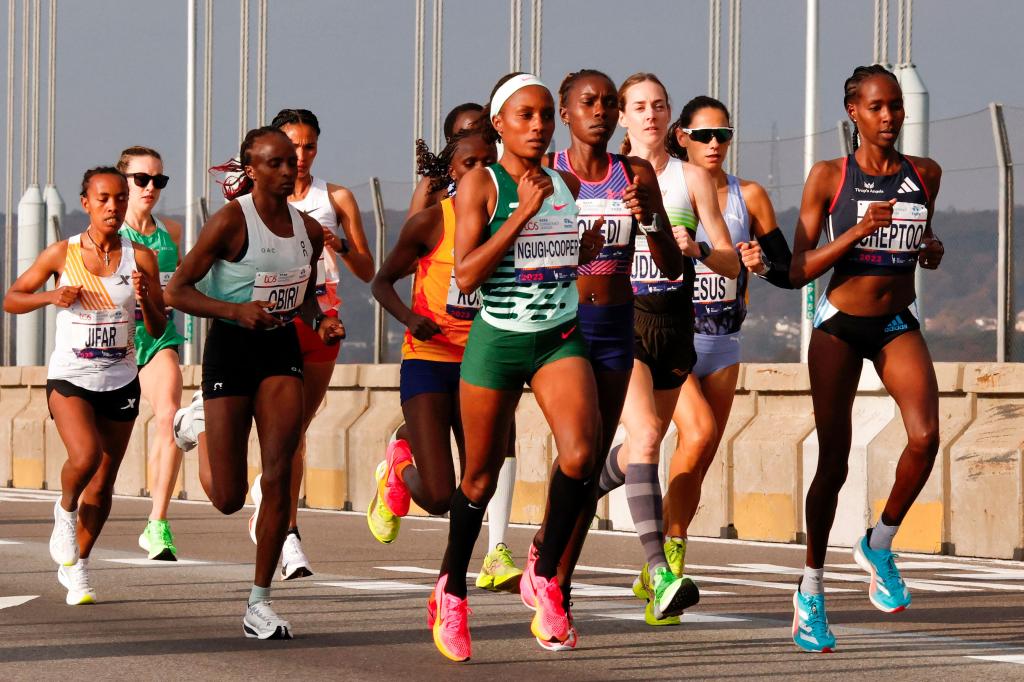The New City Marathon has crowned another winner.
Hellen Obiri, of Kenya, sprinted through the finish line just after 11 a.m. Sunday, winning the women’s New York City Marathon with an unofficial time of 2:27:23.
Obiri, 33, outran Letsenbet Gidney, of Ethiopia, in a final push. The two had been neck-and-neck for the first stretch before Obiri managed to come out ahead.
Tamirat Tola, of Ethiopia, was the first to cross the finish line for the men’s New York City Marathon, bringing in an unofficial time of 2:04:59.
Tola, 32, pulled ahead of the rest of the men about five miles before the finish line.
Two three-time wheelchair race winners crossed the finish line earlier in the morning while the elite men’s and women’s races were still underway.
Marcel Hug, of Switzerland, won his third straight men’s wheelchair race with an unofficial time of 1:25:28, breaking the record previously held by Kurt Fearnley.
It was his sixth New York City Marathon win. With the victory, he also became the first person ever to win all six World Marathon Majors in a single year.
Catherine Debunner, also of Switzerland won the women’s wheelchair race, her third straight marathon win and first time in New York City.
This year’s triumphs followed an exciting 2022 win by Evans Chebet, who pulled off the 26.2-mile feat in two hours, eight minutes, and 41 seconds. He was followed up by Shura Kitata, who came in 13 seconds behind him.
Sharon Lokedi won the female race, soaring across the finish line – located at Central Park West and 67th Street – at total time of two hours, 23 minutes, and 23 seconds last year. The female runner-up, Lonah Chemtai Salpeter, crossed seven seconds after her.
The NYC marathon, which is the biggest in the world, starts in Staten Island before making its way through all five boroughs and ending in Midtown Manhattan.
This year, the race coincides with daylight savings time. It officially ends at 2 a.m. on Nov. 5 – just hours before the big race is set to start off with a bang.
“That one-hour change may not seem like much, but it can wreak havoc on people’s mental and physical well-being,” Dr. Charles Czeisler, professor of sleep medicine at Harvard Medical School’s Division of Sleep Medicine, said in an interview with the school.
“Disrupted sleep can cause people to feel fatigued, groggy and less focused.”
Czeisler recommends runners gradually adjust their bedtimes a few days before the race.
The NYC marathon began in 1970 and only 55 runners completed the race. Gary Muhrcke won the race, becoming the first to ever cross the finish line at two hours, 31 minutes, and 38 seconds.
The following year, the first woman, Beth Bonner, won the race, finishing the race in two hours, 31 minutes, and 38 seconds.
Prior to 1976, the race’s course ran in multiple loops around Park Drive and Central Park. After 1976, the race changed course to include all five boroughs, starting in Staten Island, before traveling through Brooklyn, Queens, the Bronx, and concluding in Manhattan, according to Olympics.com.
The fastest time ever recorded in the Big Apple marathon was completed by Geoffrey Mutai in 2011, who pulled in the record-breaking feat in two hours, five minutes, and six seconds.
The fastest marathon time was completed by Kelvin Kiptum, of Kenya, who completed the 2023 Chicago marathon in two hours and 35 seconds – keeping an average pace of four-minute and 36-second mile times.
The fastest American time was two hours, five minutes, and 38 seconds – completed by Khalid Khannouchi in the 2002 London marathon, according to Runners World.
The 2023 New York City race aired on ABC and ESPN Sunday, broadcasting into the homes of 534 million across 206 countries.
Source









